Stay on the lookout for kidney disease—a silent killer that lurks quietly and strikes with dangerous consequences before most people even notice.
There are many symptoms for kidney disease that seem commonplace or unrelated to your kidneys.
Changes in urinary function and kidney-area pain are only two of several symptoms including swelling, fatigue, general weakness, dizziness, inability to concentrate, skin rashes, and feeling cold all the time.
The general nature of the symptoms creep up. Doctors agree that kidney disease is rampant in the United States and current detection techniques often catch it too late.
Here are 5 common risk factors for kidney disease:
1. Metabolic Syndrome, Heart Disease, Diabetes
Problems with your metabolism and heart trouble contribute to poor kidney function. Doctors have long linked kidney disease with excessive sugar intake and diabetes, but only recently in a study published in the Journal of the American Society of Nephrology did they determine that general metabolic disorders were risk factors as well.
The key to understanding all metabolic disorders and their relationship to kidney disease might be sugar intake.
The American Journal of Clinical Nutrition includes research that indicates a link between diets high in sugar and kidney problems.
If you want to avoid kidney disease and the related problems of diabetes, obesity, and heart disease, stay away from too much fructose sugar!
2. Sugary Beverages
The easiest way to reduce dietary fructose sugar is to eliminate sugar-rich sodas and juices from your diet. Fruit juice might look healthy, but in large quantities it is a significant contributor to insulin spikes and the kidney problems that accompany metabolic disorders.
Don’t completely cut fruit juice from your diet. If you need fruit consider whole fruits instead of juice. Whole fruits, according to one study, don’t produce the same insulin spike because of their fiber content.
3. High Salt Intake
Studies show that in addition to reducing your blood pressure, reducing your intake of salt can also prevent kidney disease. Researcher Paul Sanders recently published a report that suggests high levels of dietary salt cause “end-organ damage,” particularly in the kidneys. Avoiding salt might be the key to preventing renal damage.
4. Alcohol Intake
Excessive alcohol use is a leading contributor to unbalanced electrolyte levels and improper kidney function. According to German researchers, the long-term effects of alcohol overconsumption include water and salt retention and the expansion of extracellular volume.
...[ Continue to next page ]
Share This Post















